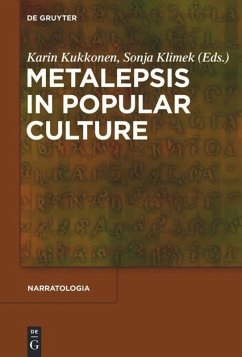When readers become victims of the murder mysteries they are immersed in, when superheroes embark on a quest to challenge their authors or when the fictional rock band Gorillaz flirt with Madonna during their performance, then metalepsis in popular culture occurs. Metalepsis describes the transgression of the boundary between the fictional world and (a representation of) the real world. This volume establishes a transmedial definition of metalepsis and explores the phenomenon in twelve case studies across media and genres of popular culture: from film, TV series, animated cartoons, graphic novels and popular fiction to pop music, music videos, holographic projections and fan cultures.
Narrative studies have considered metalepsis so far largely as a phenomenon of postmodern or avant-garde literature. Metalepsis in Popular Culture investigates metalepsisâ?? ties to the popular and traces its transmedial importance through a wealth of examples from the turn of the 20th century to this day. The articles also address larger issues such as readerly immersion, the appeal of complexity in popular culture, or the negotiation of fiction and reality in media, and invite readers to rethink these issues through the prism of metalepsis.
Narrative studies have considered metalepsis so far largely as a phenomenon of postmodern or avant-garde literature. Metalepsis in Popular Culture investigates metalepsisâ?? ties to the popular and traces its transmedial importance through a wealth of examples from the turn of the 20th century to this day. The articles also address larger issues such as readerly immersion, the appeal of complexity in popular culture, or the negotiation of fiction and reality in media, and invite readers to rethink these issues through the prism of metalepsis.








